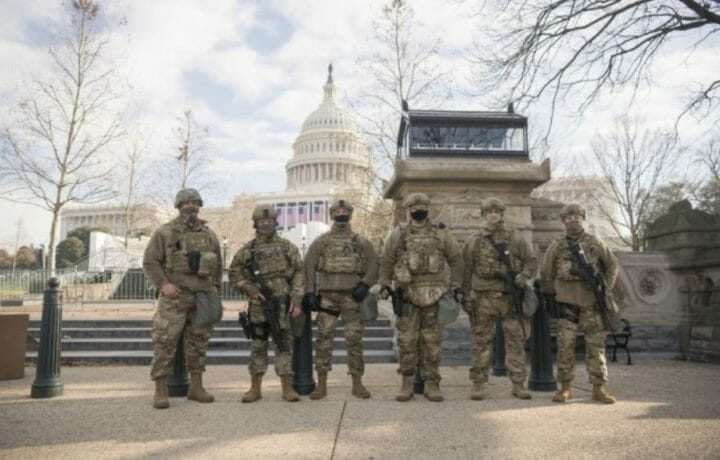Update: While there have been discussions happening for months about National Guard funding and with a deadline looming, it seemed Congress was not going to find a way to compromise to help solve the problem the National Guard and Capitol police were facing. However, Congress came together and passed a $2.1 billion emergency security supplement bill on July 29 with a unanimous Senate vote and only 11 dissents in the House of Representatives. A big portion of the bill was also focused on the Afghanistan Special Immigration Visa program.
While the streets of Washington D.C. are no longer are filled with National Guard soldiers like this past winter, that doesn’t mean that the National Guard is not still feeling the after effects of being called into action. The National Guard says they need to recoup the costs of $520 million by August 1, or they will be forced to cancel training events, schools, and weekend drills – even grounding aircrafts.
The New Fiscal Year Feels Faraway
According to Military.com, in June, the National Guard sent a memo to Congress to recuperate the costs the forces spent from January to May on Capitol Security. They needed to receive assurance by July 1 but their leaders are still waiting, warning about annual training cancellations and a shutdown until the end of the year. If the National Guard does not receive funding before August 1, commanders in all 54 US states and territories will be notified to brace for halted operations and the potential cancellation of drills in August and September. The new fiscal year begins on October 1.
The lack of funding not only will affect members pay and lead to the potential for troops to have trainings cut they need to be mission ready. For example, the National Guard’s 54th Security Forces Assistance Brigade is currently preparing for an upcoming overseas deployment with training scheduled in August. Without repayment, that training may be canceled but the deployment overseas will still happen. “So, we will potentially place our soldiers and our airmen in harm’s way and not being trained at a level of proficiency that I would deem necessary to deploy,” said Brig Gen Dale Lyles, the top officer for the Indiana National Guard.
Congress Tries to Figure Out What to Do
And while lawmakers agree that the National Guard should be reimbursed for the role they played from January to May, the funding has been lost in arguments about the legislation in which the repayment would be included. Currently, the repayment is tied up in various bills that also provides efforts to improve Capitol security. Ranging from $632.9 million to $3.7 billion. In May, Democrats in the House passed a $1.9 Billion plan without a single Republican vote but it has yet to pass the Senate.
Late last week, two Republicans, Reps. Steve Womack, R-Ark and Ken Calvert, R-Calif, introduced a bill that would specifically focus on paying back the National Guard. Rep Wormack said, “The bill is a simple solution to a problem that shouldn’t exist. Instead of partisan bickering and bloated spending packages that do not meet the definition of ‘emergency,’ it is time for Congress to do its most basic duty and provide our men and women in uniform with the funding they are owed.”
As August quickly approaches, fear that the funding will not come has only intensified. National Guard leaders have spent hours every day on the phone with lawmakers explaining the problems that the funding gap could create. Neely ended his teleconference by saying, “We wouldn’t be having this teleconference today if we had a high confidence that we would get the funding in time.”




